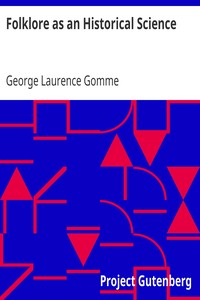| Author |
Gomme, George Laurence, 1853-1916 |
| Title |
Folklore as an Historical Science
|
| Note |
Reading ease score: 54.0 (10th to 12th grade). Somewhat difficult to read.
|
| Credits |
Produced by Clare Boothby, Sam W. and the Online Distributed
Proofreading Team at http://www.pgdp.net
|
| Summary |
"Folklore as an Historical Science" by George Laurence Gomme is a scientific publication written in the early 20th century. The work examines the intricate relationship between history and folklore, arguing that folklore can provide significant historical insight into the psychological, social, and cultural evolution of humanity. Through various examples and analyses, the author plans to reveal how folklore serves as a valuable resource for understanding historical events and societal structures. The opening of the text lays the groundwork for the exploration of folklore as a legitimate historical source, addressing the prevailing skepticism surrounding its value among historians. Gomme highlights the gaps within traditional historical narratives and emphasizes that folklore can fill these voids by preserving details about everyday life, community customs, and significant events that formal history often overlooks. He suggests that by integrating folklore into historical studies, researchers can gain a more comprehensive understanding of past societies, illustrating this with the rich tradition surrounding the "Pedlar of Swaffham" as a case study. This serves as a prime example of how local legends encapsulate broader historical truths, bridging the divide between folklore and recorded history. (This is an automatically generated summary.)
|
| Language |
English |
| LoC Class |
GR: Geography, Anthropology, Recreation: Folklore
|
| Subject |
Folklore
|
| Category |
Text |
| EBook-No. |
21852 |
| Release Date |
Jun 18, 2007 |
| Copyright Status |
Public domain in the USA. |
| Downloads |
199 downloads in the last 30 days. |
|
Project Gutenberg eBooks are always free!
|

